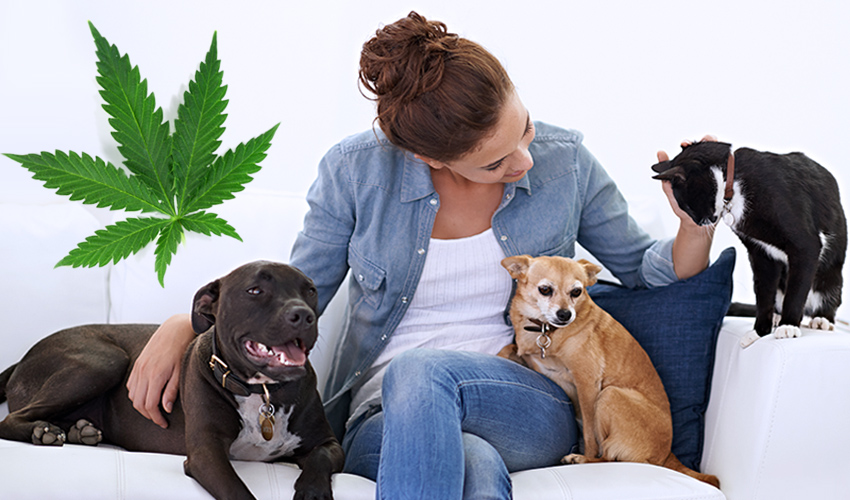With the legalization of cannabis in several U.S. states and Canada, pet owners are naturally becoming increasingly concerned about the effects of cannabis and cannabis-based products on pets through accidental exposure or consumption.
Given the effects that cannabis can have on pets, the concerns are certainly well-founded.
What gives cannabis its psychoactive and medicinal effects?
Cannabis is the name of a family of flowering plants that include hemp (grown almost exclusively for industrial and nutritional uses) and cannabis sativa (popularly known as marijuana). Cannabis contains more than 100 different chemical compounds called cannabinoids, including two of the most-studied cannabinoids:
- Tetrahydrocannabinol (THC), the psychoactive cannabinoid that causes the euphoric “high” feeling.
- Cannabidiol (CBD), which does not have any psychoactive effects but has shown great promise in treating a variety of human health conditions, including seizures, nausea, stress, anxiety, arthritis, back pain, gastrointestinal disorders and other conditions.
Hemp contains low concentrations of THC (roughly 0.3%) and higher concentrations of CBD. Cannabis sativa can contain anywhere from 5-20% THC and varying levels of CBD, depending on the strain of the cannabis plant.
How do cats and dogs become intoxicated?
Most pet exposures tend to be accidental, resulting from curious pets discovering cannabis in tempting edible forms like brownies, cookies and candies. Pets can also become intoxicated by inhaling second-hand cannabis smoke or eating dried cannabis leaves and flowers.
What are the dangers of cannabis to pets?
Because dogs have more cannabinoid receptors in their brains than humans, the effects of cannabinoids can be more dramatic and potentially more toxic when compared to humans. As a result, a small amount of cannabis may be all it takes to cause toxicity in pets.
Depending on how much cannabis a pet ingests or inhales, signs of cannabis toxicity in pets include:
- disorientation
- lack of coordination
- excessive drooling or vomiting
- low heart rate
- urine leakage
- hyperactivity and vocalization
- a wide-eyed look due to pupil dilation
Signs of toxicity can last for minutes or several hours, and in some cases, cannabis toxicity can cause tremors, seizures or coma.
How do vets treat cannabis intoxication in pets?
Treatment may include IV fluids, anti-vomiting medication or the administration of activated charcoal to bind the toxin in a pet’s stomach or intestines to the charcoal and prevent absorption into the body. Treatment may also include a quiet, secure environment in which a pet can rest until the effects of cannabis have worn off.
What about CBD?
With the growth of cannabis legalization, CBD therapies for humans are also on the rise, and they’re on the horizon for pets as well. However, the pet benefits of CBD remain unclear. While veterinarians in Canada and the U.S. currently cannot legally prescribe CBD for pets, clinical trials have begun on the use of cannabis-based products for pets to help treat conditions like osteoarthritis, anxiety and epilepsy. If the results of the trials prove to be positive, Health Canada and the FDA may eventually approve the use of CBD products and treatments for pets.
Despite inconclusive CBD benefits to pets, companies in some countries are legally allowed to sell CBD products containing no more than 0.3% THC. This has led to a huge market of pet products containing CBD, including treats, sprays, balms, oils and other products. Yet many of the products have not been fully researched, and many of the positive effects are only based on preliminary results and/or anecdotal evidence.
If your pet has a health condition for which you believe CBD may be the right treatment, speak with your veterinarian before you purchase any CBD pet product. Blindly giving CBD to your pet without taking the right precautions could be a recipe for disaster, and your veterinarian has options to help your pet’s health condition.
How do I protect my pet from cannabis toxicity?
Keep all cannabis products (medicinal or recreational, edible or otherwise) secured and out of reach of your pet. This includes live cannabis plants offering temptingly snackable green leaves.
If smoking or vaping cannabis, go outside for maximum ventilation and protection for your pet against second-hand smoke. If you can’t go outside, place your pet in a separate, well-ventilated room with the door closed and smoke/vape as far from that room as possible, preferably by an open window.
Even after exercising precautions, pets can still become intoxicated from cannabis. If you suspect your pet has become intoxicated from eating or inhaling cannabis, take your pet to your veterinarian or hospital emergency room immediately and be honest about what your pet has consumed/inhaled. Your veterinarian can treat your pet easier and faster if all the facts have been provided.






